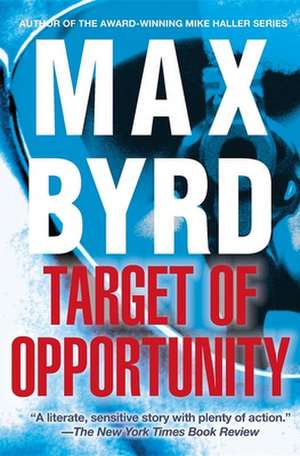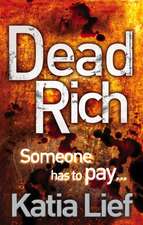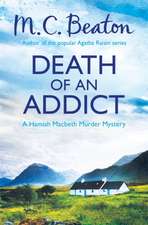Target of Opportunity
Autor Max Byrden Limba Engleză Paperback – 15 oct 2012
Bestselling author Max Byrd delivers a brilliant, revenge-filled tale of a WWII Police Inspector, who trails his vengeful sister-in-law after her husband’s death.
Target of Opportunity opens in the midst of World War II as San Francisco Police Inspector Gilman and his brother-in-law, former Washington attorney Donald Kerwin, stop into a 7-Eleven—and are met with a torrent of bullets. A gunman at the register kills Kerwin and wounds Gilman, and an illegal police search follows, leading to a dismissal of charges against the suspect. Gilman’s sister-in-law Nina is not only heavily distraught over her husband’s death but violently outraged at the illegal search. When she learns that the killer is returning to Boston, she trails him, out for revenge, and Gilman follows to stop her. Masterfully weaving history, plot, and emotion, Target of Opportunity is an unforgettable achievement.
Target of Opportunity opens in the midst of World War II as San Francisco Police Inspector Gilman and his brother-in-law, former Washington attorney Donald Kerwin, stop into a 7-Eleven—and are met with a torrent of bullets. A gunman at the register kills Kerwin and wounds Gilman, and an illegal police search follows, leading to a dismissal of charges against the suspect. Gilman’s sister-in-law Nina is not only heavily distraught over her husband’s death but violently outraged at the illegal search. When she learns that the killer is returning to Boston, she trails him, out for revenge, and Gilman follows to stop her. Masterfully weaving history, plot, and emotion, Target of Opportunity is an unforgettable achievement.
| Toate formatele și edițiile | Preț | Express |
|---|---|---|
| Paperback (1) | 87.83 lei 3-5 săpt. | |
| Turner (TN) – 15 oct 2012 | 87.83 lei 3-5 săpt. | |
| Hardback (1) | 193.79 lei 3-5 săpt. | |
| Turner – 15 oct 2012 | 193.79 lei 3-5 săpt. |
Preț: 87.83 lei
Nou
Puncte Express: 132
Preț estimativ în valută:
16.81€ • 17.50$ • 14.21£
16.81€ • 17.50$ • 14.21£
Carte disponibilă
Livrare economică 17 februarie-03 martie
Preluare comenzi: 021 569.72.76
Specificații
ISBN-13: 9781618580290
ISBN-10: 1618580299
Pagini: 324
Dimensiuni: 133 x 203 x 19 mm
Greutate: 0.37 kg
Editura: Turner (TN)
ISBN-10: 1618580299
Pagini: 324
Dimensiuni: 133 x 203 x 19 mm
Greutate: 0.37 kg
Editura: Turner (TN)
Recenzii
“Max Byrd’s plots, like his wit, are sinister and charming.” —Diane Johnson, bestselling author of The Shadow Knows
“Max Byrd is an expert at mingling real historical figures with his invented characters.” —The New York Times
“Lock Byrd’s cage and throw away the key—until he slips out a few more thrillers.” —The Philadelphia Enquirer
“Max Byrd is a fine and forceful writer.” —Lawrence Block, bestselling author of Eight Million Ways to Die
“Max Byrd is in the first division of American crime writing.” —The New York Times
“Max Byrd is an expert at mingling real historical figures with his invented characters.” —The New York Times
“Lock Byrd’s cage and throw away the key—until he slips out a few more thrillers.” —The Philadelphia Enquirer
“Max Byrd is a fine and forceful writer.” —Lawrence Block, bestselling author of Eight Million Ways to Die
“Max Byrd is in the first division of American crime writing.” —The New York Times
Notă biografică
Max Byrd is the award-winning author of fourteen books, including four bestselling historical novels and California Thriller, for which he received the Shamus Award. He was educated at Harvard and King’s College Cambridge, England, and has taught at Yale, Stanford, and the University of California. Byrd is a Contributing Editor of The Wilson Quarterly and writes regularly for the New York Times Book Review. He lives in California.
Extras
In thirty seconds he spotted her again, looking over her shoulder and ducking behind the signboard of a pizza parlor. A middle-aged man grabbed drunkenly for her arm and she shook him away, whatever she said cut off by wind and sounds of traffic. The red boots flashed, then disappeared.
At the corner of Washington and Winter Streets he spotted her once more, silhouetted for a heartbeat under a streetlamp. Between them, up and down Washington Street, big-finned cars slid past in pools of light. She turned and ran.
A signal changed half a block away and Gilman was twice driven back by horns and fenders as he tried to cross. When he finally sprinted between two trucks and reached the streetlamp, the sidewalk was clear all the way to the corner: no Goddard, no Janice. At the end of the block, panting, he looked up and saw a dead neon sign over a double door: Avery Hotel. The hand-lettered sign underneath it said “Closed for Good. No Trespassing.” Sheets of plywood covered the first-floor windows, on each one a stapled notice said the Avery Hotel was condemned by the board of health, an unsafe building.
Gilman retraced his steps at a trot and found a dark, narrow alley lined with dumpsters, their great rusty jaws overflowing with thrash.
Where was she?
Every instinct he had as a cop told him something was wrong. She was lying about Turelli; he could taste it. Was she lying about Nina too? Was Nina here?
He kicked through the trash from the filthy dumpsters and found himself in a faint circle of light. Twenty feet in front of him was a delivery door covered with board-of-health signs and spray-can graffiti. There were no lights behind the door, no sounds. Gilman tried the handle and pulled it open.
Cold, black, a sensation of falling: the murky light, beams of lumber, door frames, nameless vertical objects rose from the floor. Fixtures hung down from the ceiling like roots. Farther on he could see only pale wormy lines of blue and gray that crept over the tops of plywood barriers, or scuttled under their edges.
Corridor. Kitchen. Hallway. By the time he reached the lobby his eyes had adjusted enough to let him pick out shapes, his feet had developed their own shuffling rhythm over the invisible floor. Janice Nhu would have had a flashlight ready, to move so fast.
He paused. A railing, stairs. When he squinted hard and looked sideways he could see what must have been the registration desk in the lobby, a glint of light on metal hooks.
On the second floor there was no more plywood over the windows. Yellow stripes from moving headlights writhed up the walls and over the ceiling like snakes.
Gilman started down the corridor. Some of the doors to the room were open, allowing light to filter through. The closed doors yielded to his touch. He stepped inside each room, sniffed, waited to focus. His imagination filled them all with faces—she could be in any one of them. Janice. Or Nina. Or both.
On the third floor he peered from the window of a corner room.
In the distance, small and sharply lit, he could see the street-lamps in the Public Garden. Along the sidewalk pedestrians were leaving a Boylston Street theater; in the street cars wove in and out, noiselessly signaling. He stepped back and hurried through the empty room, stripped of all furniture.
When he reached the main corridor again even the faint noises of the street faded away, leaving him only the hiss of his ears. His thoughts made audible. His head was a bowl of breaking waves, an antenna pulling sound from the air. He drew the pistol from its holster and walked along the center of the musty, spongelike carpet.
Sixteen rooms to a side. Elevator doors in the center. Maids’ closet. One short dogleg corridor. At the elevator doors he stopped again, listening. Far below, in the cave’s belly, cables creaked and twisted. Metal retreated from the cold New England night, groaning. He passed on, to the darkest stretch.
How could he be alone? His ears were filled with voices. His skin was like iron, his blood drummed against it. He stopped and picked out the single open door to his left where shadows seemed to be moving.
Empty.
He gripped his pistol regulation-fashion so that the muzzle pointed at the ceiling, and he took a step forward just as the first shot blasted the air apart and set off a bomb in his ears.
“You!”
High-pitched, furious, out of the darkness.
Gilman rolled over the carpet, tumbling, dodging. The face above him floated, fired again, too high, and Gilman himself sat up and fired once, twice, and Victor Turelli vanished.
At the corner of Washington and Winter Streets he spotted her once more, silhouetted for a heartbeat under a streetlamp. Between them, up and down Washington Street, big-finned cars slid past in pools of light. She turned and ran.
A signal changed half a block away and Gilman was twice driven back by horns and fenders as he tried to cross. When he finally sprinted between two trucks and reached the streetlamp, the sidewalk was clear all the way to the corner: no Goddard, no Janice. At the end of the block, panting, he looked up and saw a dead neon sign over a double door: Avery Hotel. The hand-lettered sign underneath it said “Closed for Good. No Trespassing.” Sheets of plywood covered the first-floor windows, on each one a stapled notice said the Avery Hotel was condemned by the board of health, an unsafe building.
Gilman retraced his steps at a trot and found a dark, narrow alley lined with dumpsters, their great rusty jaws overflowing with thrash.
Where was she?
Every instinct he had as a cop told him something was wrong. She was lying about Turelli; he could taste it. Was she lying about Nina too? Was Nina here?
He kicked through the trash from the filthy dumpsters and found himself in a faint circle of light. Twenty feet in front of him was a delivery door covered with board-of-health signs and spray-can graffiti. There were no lights behind the door, no sounds. Gilman tried the handle and pulled it open.
Cold, black, a sensation of falling: the murky light, beams of lumber, door frames, nameless vertical objects rose from the floor. Fixtures hung down from the ceiling like roots. Farther on he could see only pale wormy lines of blue and gray that crept over the tops of plywood barriers, or scuttled under their edges.
Corridor. Kitchen. Hallway. By the time he reached the lobby his eyes had adjusted enough to let him pick out shapes, his feet had developed their own shuffling rhythm over the invisible floor. Janice Nhu would have had a flashlight ready, to move so fast.
He paused. A railing, stairs. When he squinted hard and looked sideways he could see what must have been the registration desk in the lobby, a glint of light on metal hooks.
On the second floor there was no more plywood over the windows. Yellow stripes from moving headlights writhed up the walls and over the ceiling like snakes.
Gilman started down the corridor. Some of the doors to the room were open, allowing light to filter through. The closed doors yielded to his touch. He stepped inside each room, sniffed, waited to focus. His imagination filled them all with faces—she could be in any one of them. Janice. Or Nina. Or both.
On the third floor he peered from the window of a corner room.
In the distance, small and sharply lit, he could see the street-lamps in the Public Garden. Along the sidewalk pedestrians were leaving a Boylston Street theater; in the street cars wove in and out, noiselessly signaling. He stepped back and hurried through the empty room, stripped of all furniture.
When he reached the main corridor again even the faint noises of the street faded away, leaving him only the hiss of his ears. His thoughts made audible. His head was a bowl of breaking waves, an antenna pulling sound from the air. He drew the pistol from its holster and walked along the center of the musty, spongelike carpet.
Sixteen rooms to a side. Elevator doors in the center. Maids’ closet. One short dogleg corridor. At the elevator doors he stopped again, listening. Far below, in the cave’s belly, cables creaked and twisted. Metal retreated from the cold New England night, groaning. He passed on, to the darkest stretch.
How could he be alone? His ears were filled with voices. His skin was like iron, his blood drummed against it. He stopped and picked out the single open door to his left where shadows seemed to be moving.
Empty.
He gripped his pistol regulation-fashion so that the muzzle pointed at the ceiling, and he took a step forward just as the first shot blasted the air apart and set off a bomb in his ears.
“You!”
High-pitched, furious, out of the darkness.
Gilman rolled over the carpet, tumbling, dodging. The face above him floated, fired again, too high, and Gilman himself sat up and fired once, twice, and Victor Turelli vanished.
Textul de pe ultima copertă
Target of Opportunity opens in the midst of World War II as San Francisco Police Inspector Gilman and his brother-in-law, former Washington attorney Donald Kerwin, stop into a 7-Eleven—and are met with a torrent of bullets. A gunman at the register kills Kerwin and wounds Gilman, and an illegal police search follows, leading to a dismissal of charges against the suspect. Gilman’s sister-in-law Nina is not only heavily distraught over her husband’s death but violently outraged at the illegal search. When she learns that the killer is returning to Boston, she trails him, out for revenge, and Gilman follows to stop her. Masterfully weaving history, plot, and emotion, Target of Opportunity is an unforgettable achievement.
Descriere
Bestselling author Max Byrd delivers a brilliant, revenge-filled tale of a WWII Police Inspector, who trails his vengeful sister-in-law after her husband’s death.
Target of Opportunity opens in the midst of World War II as San Francisco Police Inspector Gilman and his brother-in-law, former Washington attorney Donald Kerwin, stop into a 7-Eleven—and are met with a torrent of bullets. A gunman at the register kills Kerwin and wounds Gilman, and an illegal police search follows, leading to a dismissal of charges against the suspect. Gilman’s sister-in-law Nina is not only heavily distraught over her husband’s death but violently outraged at the illegal search. When she learns that the killer is returning to Boston, she trails him, out for revenge, and Gilman follows to stop her. Masterfully weaving history, plot, and emotion, Target of Opportunity is an unforgettable achievement.
Target of Opportunity opens in the midst of World War II as San Francisco Police Inspector Gilman and his brother-in-law, former Washington attorney Donald Kerwin, stop into a 7-Eleven—and are met with a torrent of bullets. A gunman at the register kills Kerwin and wounds Gilman, and an illegal police search follows, leading to a dismissal of charges against the suspect. Gilman’s sister-in-law Nina is not only heavily distraught over her husband’s death but violently outraged at the illegal search. When she learns that the killer is returning to Boston, she trails him, out for revenge, and Gilman follows to stop her. Masterfully weaving history, plot, and emotion, Target of Opportunity is an unforgettable achievement.














